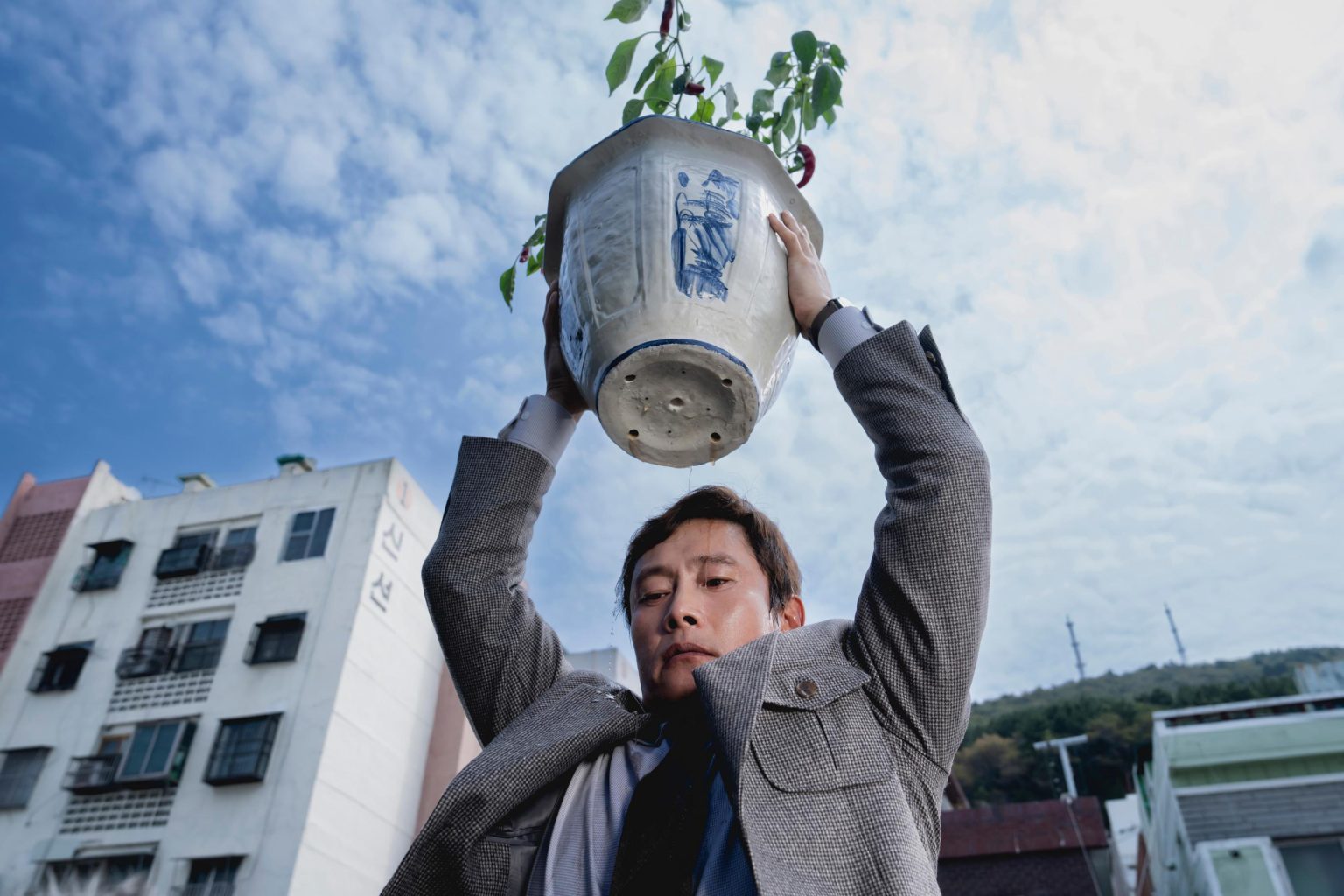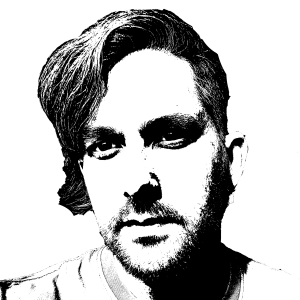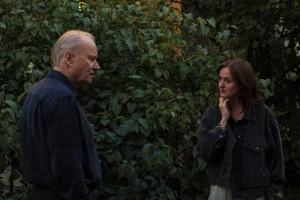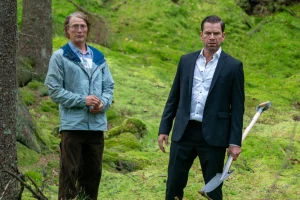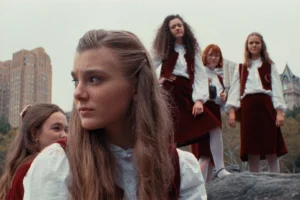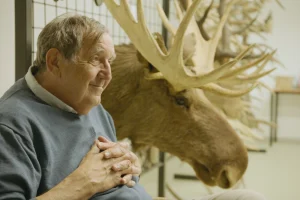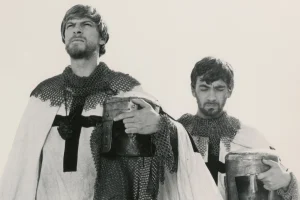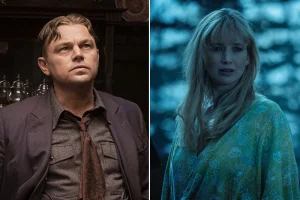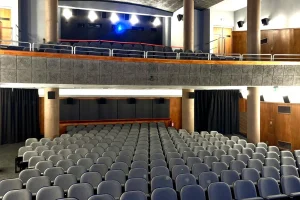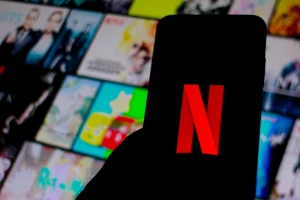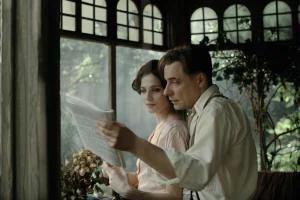A family man goes to extreme lengths to preserve what is rightfully his after losing his job in No Other Choice, which premiered at the Venice International Film Festival and opens in Prague cinemas from Nov. 27 (with English subtitles at Kino Světozor, Kino Aero, and Bio Oko). This masterfully-directed black comedy rates alongside Oldboy and The Handmaiden as one of Park Chan-wook‘s best movies, while the playfully detached sense of irony represents something quite different than what the filmmaker has delivered in the past.
No Other Choice stars Lee Byung-hun as Man-su, paper company manager and 2019’s Pulp Man of the Year who has it all: a spacious home in the suburbs, loving wife Lee Mi-ri (Son Ye-jin), children Si-one (Woo Seung Kim) and Ri-one (So Yul Choi), and a pair of golden retrievers. In the film’s opening scene, he cooks some eel on the grill—a gift from the company—while embracing his loved ones in an lengthy family hug. This man has all he could ever want.
Until he quite suddenly doesn’t. Shortly after his paper company is taken over by Americans, Man-su loses his job; the eel was a going-away present. While he can get menial work in a warehouse, interviews at other paper companies go nowhere despite his decades of experience. Money runs tight, and Miri goes back to work as a dental hygienist—for a young, handsome dentist—to make ends meet. The family’s home is put on the market. Their dogs go to live with Miri’s parents, and Ri-one grows despondent. Si-one turns to crime to help.
Man-su is losing everything, and develops what he sees as the only possible option to retain what he has: murder rival paper company executive Choi Seon-chul (Park Hee-soon) so he can step into his position. But he’ll have to beat out other candidates for the job. So he’ll murder them in advance, too.
No Other Choice takes a situation that is painfully relatable—job loss, financial precarity, and the pressures of sustaining a family—and turns it into a bitterly satirical but surprisingly approachable story. The result is a darkly comic exploration of human desperation closer in spirit to Woody Allen‘s Crimes and Misdemeanors or Match Point than to Park’s more intensely stylized revenge thrillers; the comedy is never broad, but it lands with precision as the director balances suspense with moral ambiguity.
The film is based on Donald E. Westlake’s 1997 novel The Ax, which was previously adapted into a 2005 film by Costa-Gavras. Park retains the novel’s sharp social satire (he co-wrote the script, originally planned to be an English-language production, with Don McKellar), yet he softens the edges to make the protagonist sympathetic, even as he engages in increasingly cold-blooded acts.
That we are able to sympathize with the protagonist is thanks to Lee’s extraordinary performance in the lead. Familiar to international audiences through Hollywood blockbusters like The Magnificent Seven, G.I. Joe: Rise of the Cobra, and Terminator Genisys, Lee walks a tightrope in order to gain our empathy as Man-su rationalizes murder and is magnetic through every scene. Rooting for him to succeed—even while recognizing the horror of his acts—recalls watching Norman Bates dispose of Marion Crane’s car in Psycho, and Park delights in making the viewer complicit in his morally dubious decisions.
The film draws sharp parallels between the inhumanity of corporate structures and the extreme actions of his protagonist. After the American executive tells Man-su that the company has “no other choice” but to lay off workers, the phrase becomes a chilling mantra that Man-su adapts it as justification for his own increasingly ruthless behavior. While Man-su passionately defending his blue-collar colleagues in an early scene, by the end he is happily overseeing a fully automated factory—his moral compass drained, yet materially successful.
Kim Woo-hyung, who previously collaborated with Park on the The Little Drummer Girl (which filmed in Czechia), brings a sharp visual clarity to every scene in No Other Choice, whether the domestic intimacy of the family’s home, or the stark mechanized landscape of the paper factories. The film’s meticulous framing, nicely captured in an early flower pot scene, emphasizes the absurdity the narrative while heightening the suspense.
No Other Choice blends comedy, satire, and thriller, but the pacing and tonal shifts never feel jarring; Man-su’s plot unfolds with a perverse logic that encourages us to question our own ethical boundaries. The black comedy is sharp without becoming cruel, and the thriller elements are both suspenseful and absurd. By the time Man-su confronts his final rival, the audience is fully invested, and against our own better judgment, we rationalize right alongside him.
More than just a black comedy, No Other Choice is a piercing meditation on the parallel between human morality and corporate greed—and how desperation, in both spheres, can reshape our ethical boundaries. With impeccable direction, a deeply sympathetic lead performance, and a sharp satirical lens on the modern corporate world, Park has crafted a film that is as entertaining as it is thought-provoking. Selected as South Korea’s official submission to the 2026 Academy Awards, look for it to achieve more than just a Best International Film nomination; its director and star, especially, deserve consideration in their respective categories.

